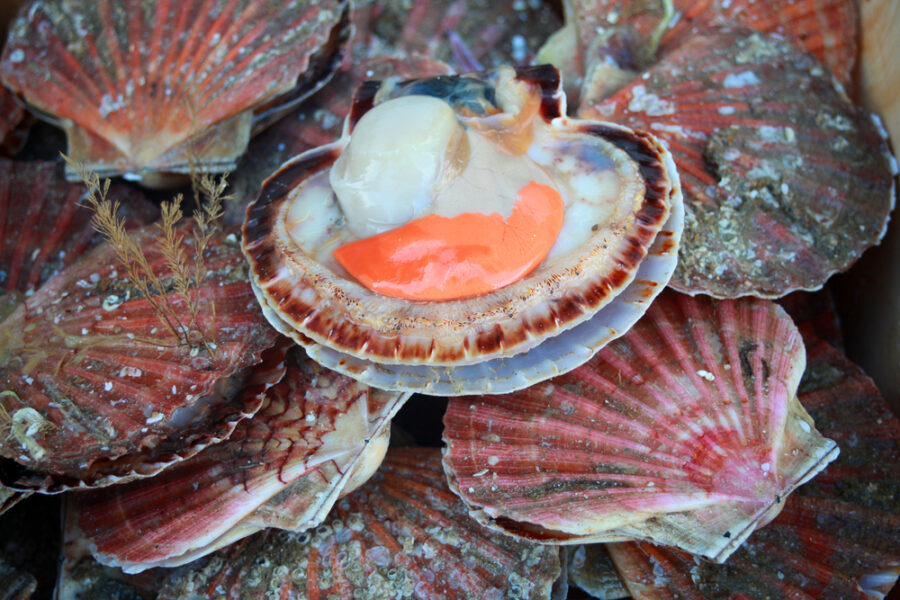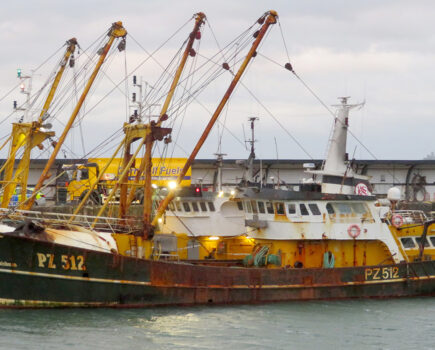Battle over Manx scallop management.
A major rift has opened up between the Scottish and Isle of Man administrations over management of the Manx king scallop fishery.
Scottish fisheries minister Fergus Ewing has said the Scottish government could invoke the dispute resolution process between UK fisheries administrations if the Isle of Man government does not call a halt to the new scallop management measures, which were due to come into force on 15 January.
At the heart of the row is a Manx government proposal that all vessels with Manx king scallop licences must report in to a Manx port daily when they fish in Manx waters for a possible inspection of their catch. The move followed concerns by the Manx scallop management board that king scallop catches were not being accurately reported (Fishing News, 18 January, ‘Manx government delays king scallop licence variation’).
The Scottish government says the Manx proposals would unacceptably restrict the Scottish scallop industry, which is worth around £3m per year in Scotland.
Earlier, following concerns expressed by the Scottish government, the Manx government had modified its original arrangements so that vessels could return to their home ports and report their catches electronically, and had thanked Marine Scotland for its ‘cooperation and support’.
Fergus Ewing said Marine Scotland had been in close contact with the Isle of Man government in recent weeks. They had made it ‘consistently clear’ that the licence changes would breach existing fisheries agreements, and would detrimentally affect Scottish fishermen.
The minister said: “We have put forward a number of alternative measures that would ensure sustainable fishing, and be more targeted, proportionate and, importantly, not disadvantage any one sector of vessels.
“I am deeply disappointed and frustrated that the Isle of Man government has not listened to these alternatives or our concerns, which is why I have been left with no option but to consider invoking the dispute resolution process as set out in the Fisheries Management Agreement (FMA).
“This has been an extremely fraught process, with the Isle of Man government failing to share its plans from the outset, failing to get involved in talks, and failing to reach a reasoned agreement.
“I would urge the Isle of Man government to come to Scotland for further discussions, as we cannot accept such an obviously restrictive measure that would damage our crews carrying out their legitimate fishing activities.”
The Isle of Man government replied that it was ‘disappointed’ with the Scottish government’s statement that it could invoke the dispute resolution process.
They said the measures were ‘urgently required’ to preserve declining stocks. “Manx officials have strong indications from catch records that some boats are taking more fish from Isle of Man waters than they are entitled to,” said the Manx government.
“Further, the Isle of Man government is disappointed that the Scottish government has not taken into account recent negotiations that have resulted in a change to the original proposals.” This refers to an amendment that allows vessels whose catch has only been taken from Manx waters to return to their home port, avoiding the need to visit Manx ports daily.
The Manx government said it did not believe it had breached the terms of the Fisheries Management Agreement, and had introduced the measures to prevent illegal scallop fishing. It would continue ‘to engage in dialogue with FMA partners to further assess the impact and continue to try and identify an alternative, effective solution’.
It says the scallop industry is worth around £12m a year to the Manx economy.
Top level discussions
As Fishing News went to print, it was revealed that the Isle of Man Chief Minister, Howard Quayle MHK, spoke with Scottish First Minister Nicola Sturgeon as efforts continue to find a mutually acceptable solution to concerns over catch misreporting.
The Chief Minister and Scottish First Minister agree the fishery must be protected in the long term, because of its economic importance, and that overfishing must be prevented.
They, and other Irish Sea jurisdictions, will explore ways to ensure vessels licensed to fish for king scallops in Manx waters adhere to catch limits. While it is hoped that an announcement would be made in a few days, the current licence condition, requiring vessels fishing both inside and outside Manx seas to report to an Isle of Man port, remains in place, pending this announcement.
The Chief Minister said: “We continue to have positive dialogue with our Irish Sea neighbours, and are confident that we can identify effective tools to address this issue, that have minimal impact on the majority of the fleet.”
N Ireland hit by Manx restrictions
The Isle of Man scallop regulations will also have an impact on Northern Ireland scallop fishermen and processors.
Alan McCulla of Kilkeel processor Sea Source, in a letter to the Northern Ireland fisheries department, said they were dependent on scallops caught in Isle of Man territorial waters at this time of year. The restrictions were ‘unhelpful’, both for the boats and processors.
He acknowledged that sensible management of the fishery was needed, and said they were ready to discuss and agree practical measures that meet with the approval of fisheries administrations either in the Isle of Man or Northern Ireland.
The Manx authorities had raised enforcement issues, but he asked where the evidence was and why the Manx authorities had not prosecuted those involved.
“It is abundantly clear that the intention of this latest restriction is less to do with the sustainable management of the fishery and more to do with giving an advantage to the processing sector in the Isle of Man, who will benefit from increased landings,” said Alan McCulla.
“The conditions may be presented as ‘non-discriminatory’, but given the lack of any consultation about the proposals with the wider industry around the Irish Sea, as well as other UK fisheries administrations, we would suggest that the Manx authorities must be in breach of the ‘fisheries management agreement’ they have with the UK.”
He said if there were legitimate concerns, why could there not be reciprocal arrangements to allow landings of scallops from the Isle of Man to be inspected and verified in Northern Ireland, as happens with other species caught in Manx territorial waters.
If the Isle of Man rejected such proposals it would be clear that the new restrictions were ‘a blatant attempt to introduce an unfair trading environment’ that favours the Isle of Man. “DAERA [Department of Agriculture, Environment and Rural Affairs] should protest in the strongest possible terms,” he said.
The situation was made worse because the MLS of Irish Sea scallops is 110mm compared with 100mm elsewhere. Northern Ireland regulations make it illegal for Sea Source or other Northern Ireland processors to process 100mm scallops, even when caught legally outside the Irish Sea.
“In a scenario where we face reduced supplies of locally-caught king scallops, then us sourcing alternative supplies becomes an even more important issue,” said Alan McCulla.
Calling for an urgent review of the situation, he said it was ‘a travesty’ that Northern Ireland fishermen who diverted their fishing outside of the Irish Sea because of the Isle of Man restrictions would not be able to land their legal 100m scallop catches in Northern Ireland, while processors elsewhere could continue to buy, process and sell such catches.
Read more news from Fishing News here.








